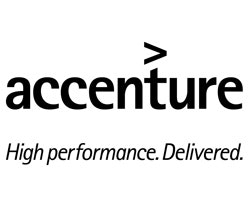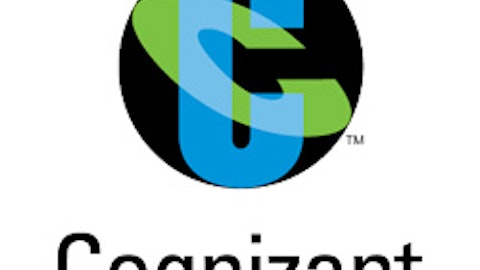
What’s wrong with Accenture?
The company just said that this year will be tough. Fiscal 2013 revenue guidance was reduced to 3% to 4% growth. The company seems to be particularly weak in Brazil and Europe. Overall, it expects $400 million more in small consulting- booking contracts (which become revenue faster due to their size), and many clients are slowing the pace and level of spending per arrangements they had with Accenture Plc (NYSE:ACN).
I suspect that a bad macroeconomic environment was one of the reasons for Accenture’s lower-than-expected performance this year, because the earnings call also showed us that Accenture Plc (NYSE:ACN) is doing quite well in countries like China, India and the U.S., where it experienced double-digit growth.
This is not necessarily a downside, as Accenture can adjust quickly to changes in the macroeconomic environment. I will explain more about the relationship between Accenture and macroeconomics later.
Revenue may be down, but profitability isn’t
The good news is that Accenture Plc (NYSE:ACN)’s profitability actually increased. Pierre Nanterme, Accenture’s chairman and CEO, said:
We delivered very good profitability, with operating margin expansion and EPS growth reflecting the disciplined management of our business… Our balance sheet remains very strong, with a cash balance of $5.9 billion, and we generated $1.4 billion in free cash flow for the quarter.
Indeed, Accenture’s EPS for this quarter is $1.21, compared with $1.03 for the third quarter of last year. Of the $0.18 in additional EPS, only $0.03 is related to higher revenue and operating results. Most of the reduction is related to reorganization liabilities and better tax rates. There is also a $0.02 effect coming from share repurchases.
As you can see, it’s good management that is making profitability increase, and not revenue. So, as Accenture benefits from a better macroeconomic environment in the next quarters, I expect profitability to increase even faster.
I expect share repurchases to continue raising EPS artificially in the future, as Accenture’s showing commitment to use most of its free cash flow either in share repurchases or paying dividends. Of the $1.4 billion in free cash flow that the company generated, $618 million was used for share repurchases and $562 million for the second biannual dividend payment.
The balance sheet couldn’t be cleaner
If Accenture Plc (NYSE:ACN)’s using most of its free cash flow to return capital to return capital to its shareholders, there may be little cash left to keep in the bank. That may be true this quarter but overall the balance sheet remains quite solid, with $5.9 billion in cash and no debt. There is no short-term need to increase the amount of cash and cash equivalents. It is more wise to use free cash flow to purchase promising companies and buy more shares. And that’s exactly what Accenture is doing. Keep also in mind that management expects to spend about 15% of the free cash flow generated this year on acquisitions!
P/E ratio isn’t as high as it seems
Accenture’s current P/E ratio stands at 15.5. This compares to Huron Consulting Group (NASDAQ:HURN) , which has a P/E of 22.1, and Cognizant Technology Solutions Corp (NASDAQ:CTSH), with a P/E of 17.5. According to Morningstar, the average P/E ratio for this Industry is 16.9. Therefore, on a P/E basis, Accenture is not expensive, despite the 10-year 300% increase in stock price.
The latest revenue miss isn’t Accenture’s fault
Forget about the idea that Accenture’s situation is critical. The latest revenue figures may be disappointing but profitability isn’t. Operating margin increased by 40 basis points since last year to 15.2%, and revenue growth is actually happening in economies that are experiencing economic growth or recovery, like China and the U.S., respectively.
Weak bookings in Brazil can be explained by the recent decline in the price of commodities. European performance is also disappointing because macroeconomic conditions are making many clients reconsider their budgets for consulting and outsourcing.
Accenture is quite dependent on the overall macroeconomic condition of the country it operates in because around 55% of its revenue comes from its consulting business. Take a look at the close correlation between Accenture’s stock price and the S&P 500 (a proxy of the overall economic performance of the U.S.) for the past 12 months. However, this is not necessarily a bad relationship, because if you see the graph well, you will see that whenever the S&P 500 goes down, Accenture’s stock price does fall as well but not that much. So, Accenture looks particularly attractive to those looking to add macroeconomic exposure to their portfolios or who are simply bullish about future macro.

How about competitors?
Like Accenture, Cognizant is also recognized as a top IT-services company. The two companies share many similarities. For example, both Accenture and Cognizant earn money in different currencies, while they have cost structures heavily dependent on Indian rupees because it’s in India where most of the work is being done.
That being said, there are also important differences. For example, Accenture Plc (NYSE:ACN) may be more efficient: it has 259,000 employees, bringing in an average of $116,000 in revenue. Cognizant, on the other hand, delivers only $45,175 per employee and has 162,700 employees.
There are also differences in the way they provide their services. As Seeking Alpha contributor Asean Century mentions, Indian companies can code a program for a problem when given the solution, but they can’t develop the solution, whereas Accenture can.
As for smaller competitors, let’s take a look at Huron Consulting. In the past six months, the stock price increased more than 40% as Huron continues increasing its revenue and profitability consistently. Adjusted EBITDA, for example, increased $13.8 million to $25.6 million in the first quarter of 2013 from $11.8 million in the first quarter of 2012. But the current P/E ratio of 22.1 seems too high to consider buying it now. I would wait to see more developments from its healthcare segment before making an investment position.
Also bear in mind that Huron Consulting’s focus in the healthcare segment may be challenged by the healthcare reform, reimbursement issues, and the competitive environment facing most hospitals and medical centers. How exposed is Huron Consulting to the healthcare reform? Well, during the last reported quarter, Huron generated revenue of $164 million, up 18.6% compared with the year-ago quarter, out of which Healthcare contributed 48%.
Conclusion
Accenture is a top IT services company that just got hit due to disappointing revenue in the latest quarter. But profitability increased and revenue base remains strong. Furthermore, macroeconomic conditions had a lot to do with Accenture Plc (NYSE:ACN)’s miss. With an excellent 2% dividend and an aggressive share-repurchase program, EPS is likely to keep growing and eventually, the stock price will increase as well. This is a great company with a bad stock. Buy the company!
Adrian Campos has no position in any stocks mentioned. The Motley Fool recommends Accenture.
The article Why You Should Buy This Cheap Consulting Company originally appeared on Fool.com.
Copyright © 1995 – 2013 The Motley Fool, LLC. All rights reserved. The Motley Fool has a disclosure policy.






